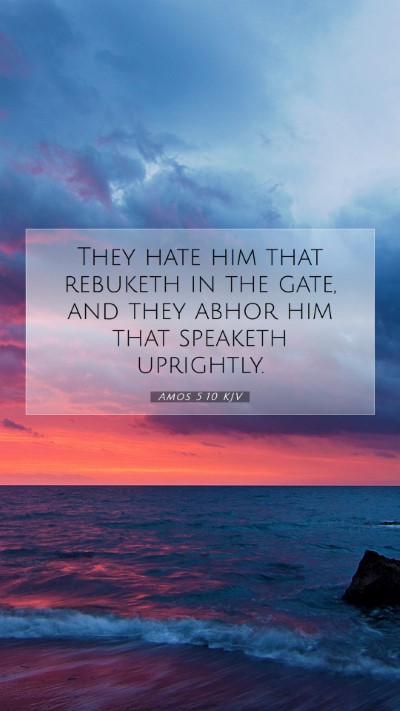Old Testament
Genesis Exodus Leviticus Numbers Deuteronomy Joshua Judges Ruth 1 Samuel 2 Samuel 1 Kings 2 Kings 1 Chronicles 2 Chronicles Ezra Nehemiah Esther Job Psalms Proverbs Ecclesiastes Song of Solomon Isaiah Jeremiah Lamentations Ezekiel Daniel Hosea Joel Amos Obadiah Jonah Micah Nahum Habakkuk Zephaniah Haggai Zechariah MalachiAmos 5:10 Meaning
What is the meaning of Amos 5:10?
They hate him that rebuketh in the gate, and they abhor him that speaketh uprightly.
Amos 5:10 Bible Verse Meaning
Understanding Amos 5:10
Amos 5:10 states: "They hate him that rebuketh in the gate, and they abhor him that speaketh uprightly." This verse encapsulates a profound theme found in the prophetic literature, illustrating the hostility faced by those who speak truthfully and justly in the midst of societal corruption. Below, we explore the meaning of this Bible verse using insights from renowned public domain commentaries, including those of Matthew Henry, Albert Barnes, and Adam Clarke.
Bible Verse Meanings and Interpretations
In this context, we observe a society that recoils from accountability and moral righteousness.
- Rejection of Truth: Henry comments on the aversion to the 'gate,' which is the place for public discourse and justice. He notes that the people despise those who dare to point out their wrongs.
- Hostility to Righteousness: Barnes expands on this notion, indicating that the 'upright' individuals are often ostracized because their moral clarity brings discomfort to a community steeped in sin.
- Calling for Accountability: Clarke elaborates that the phrase 'rebuketh in the gate' highlights the prophetic role of calling out injustice, emphasizing that such a role is met with resistance in a society that values convenience over truth.
Scripture Analysis and Biblical Exegesis
The verse serves as a commentary on the spiritual and moral decay of Israel at the time of Amos. The prophetic warnings offered by Amos were not well-received; instead, they were met with hostility and rejection. This reflects a broader theme within Scripture: the tendency of people to turn away from uncomfortable truths.
Understanding this verse requires careful consideration of its historical and cultural background. The 'gate' referred to in this context was crucial not only for practical governance but also for the administration of justice. Those who speak out against wickedness in such a setting are often seen as threats to the status quo.
Bible Study Insights
For those engaged in Bible study groups or seeking Bible study resources, this verse invites a deeper examination of the implications of speaking out against injustice. Here are a few points for consideration:
- Application of Bible Verses: Reflect on how this verse applies in contemporary settings where injustice prevails. Are we also resistant to those who challenge our views?
- Historical Context: Delve into the historical backdrop of 8th-century Israel and understand the prophetic mission of Amos. How did the societal norms of his time influence the reception of his messages?
Cross References
To enrich the study of Amos 5:10, consider these related passages:
- Micah 3:9-11: Those who abhor justice will face consequences for their actions.
- Proverbs 9:7: A warning against rebuking the wicked, as they may despise correction.
- Luke 6:26: Jesus warns that those who are praised by men stand in contrast to the true prophets who are rejected.
Conclusion
Amos 5:10 serves as a powerful reminder of the challenges faced by those who uphold righteousness and truth in a world that often favors comfort over accountability. The insights gleaned from respected commentaries provide a multifaceted understanding that can enrich one's Bible study insights and enhance Bible verse explanations in both personal reflection and group discussions.


